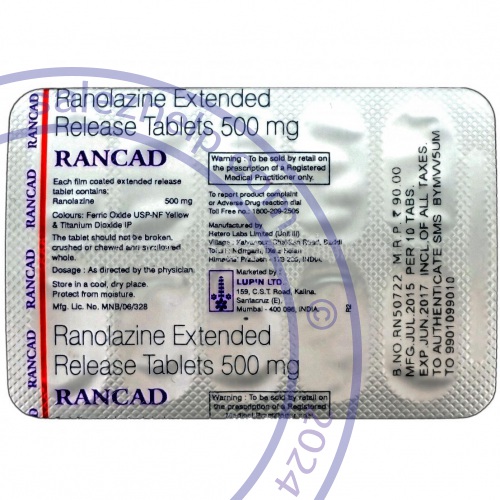Ranexa Singapore
Ranexa, also known as Ranolazine, is a prescription medication used to treat chronic angina, a type of chest pain caused by decreased blood flow to the heart. It helps improve blood flow to help the heart work more efficiently. Ranexa does not directly treat an acute episode of angina but may be part of long-term management alongside other medications. It doesn't lower the frequency of angina attacks, but helps improve exercise tolerance. Potential side effects include dizziness, constipation, nausea, and headaches.
- 500mg
- 1000mg
1. **What is Ranexa used for?**
Ranexa, or Ranolazine as it's known generically, is used to treat chronic angina; that is, chest pain resulting from reduced blood flow to the heart. It aids in improving this blood flow to enhance the efficiency of the heart. However, it's worth noting that Ranexa does not directly treat a sudden angina attack but is instead used as a part of long-term management along with other medications.
2. **How does Ranexa work?**
Ranexa works by altering the way your heart's cells use oxygen, which makes the heart more energy efficient. Exactly how it works to relieve angina symptoms is not fully understood, but specialists believe it does this by improving the metabolic efficiency of the heart.
3. **How should I take Ranexa?**
The medication typically comes in tablet form and is usually taken twice a day (morning and evening), with or without food. It is important to follow your doctor's prescribed dosage and not to crush, chew, or split the tablets as they are designed to release medication slowly in the body.
4. **Are there any side effects to taking Ranexa?**
Yes, like any medication, Ranexa may come with potential side effects. Some of the common side effects include dizziness, constipation, nausea, and headaches. More serious side effects, although rare, include changes in heartbeat or fainting. It is always essential that you contact your healthcare provider if you notice any unusual or severe symptoms after taking Ranexa.
5. **Can Ranexa interact with other medications?**
Yes, Ranexa can interact with certain other medications. These include drugs for treating viral infections, certain antidepressants, anti-fungal drugs, and certain antibiotics. It is crucial to discuss all medications you are currently taking, even over-the-counter versions, and your health history with your doctor to ensure safe administration of Ranexa.
6. **Should certain conditions, individuals or demographics avoid Ranexa?**
People with pre-existing liver conditions should not take Ranexa. It is important that your healthcare provider is aware of your complete medical history before prescribing this medication. The drug is also not recommended for pregnant women unless clearly needed.
7. **Does Ranexa affect exercise tolerance?**
Ranexa does not directly decrease the number of angina attacks, but it has been noted to improve exercise tolerance in patients, meaning they can often exercise for longer periods before symptoms return.
8. **Can I suddenly stop taking Ranexa?**
You should not stop taking Ranexa without first consulting your healthcare provider as sudden discontinuation can lead to your angina getting worse or increase your risk of having a heart attack.
9. **What should I do if I miss a dose?**
If you miss a dose, take it as soon as you remember, unless it is close to your next dose. Do not double your next dose or take more than what is prescribed. If you're uncertain, it's always best to consult your healthcare provider.
These are popular and significant points regarding Ranexa. Always reach out to your healthcare provider if you have more questions or concerns. It’s essential to remember that while this guide seeks to be comprehensive, it doesn’t replace medical advice. Various individuals might experience the medication differently, and it’s crucial to talk to your healthcare provider for personalized advice.



